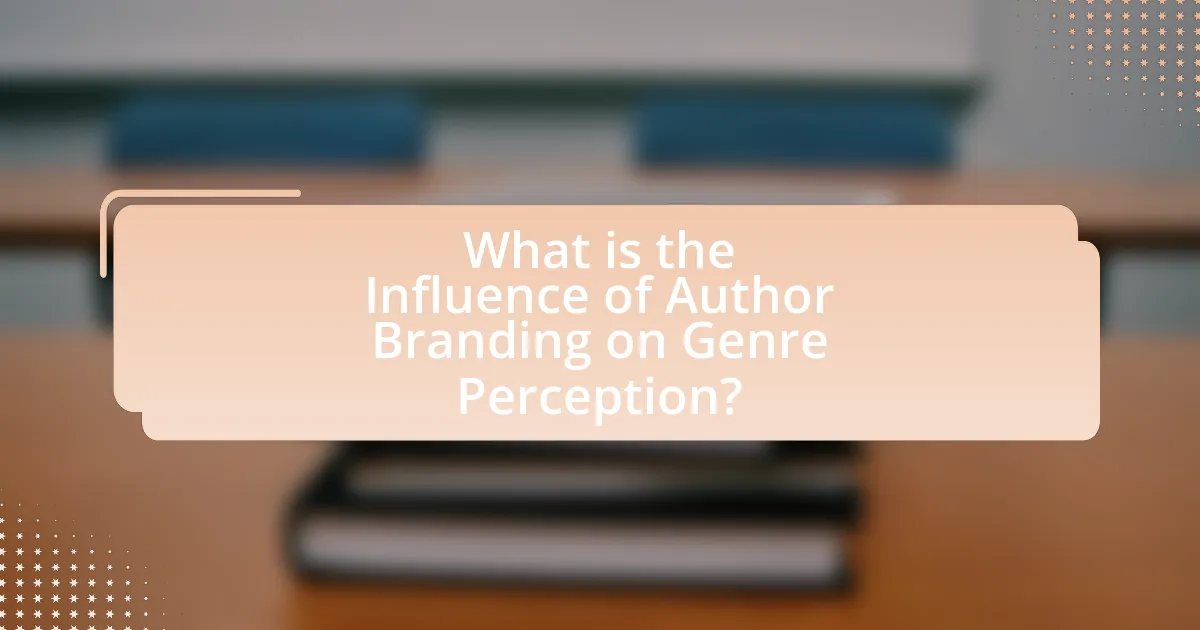The article examines the influence of author branding on genre perception, highlighting how a strong author brand shapes readers’ expectations and categorization of literary works. It discusses the elements that contribute to an author’s brand identity, such as writing style, genre specialization, and public persona, and how these factors affect marketability and reader loyalty. The article also explores the challenges authors face in establishing their brand, common pitfalls, and strategies for effective branding across different genres, ultimately emphasizing the importance of cohesive branding in enhancing visibility and driving sales within the publishing industry.

What is the Influence of Author Branding on Genre Perception?
Author branding significantly influences genre perception by shaping readers’ expectations and associations with specific genres. When an author establishes a strong brand, it creates a recognizable identity that can lead readers to categorize their works within certain genres, often based on previous successful titles. For instance, an author known for thrillers may have their new releases automatically perceived as thrillers, regardless of the actual content, due to their established brand. This phenomenon is supported by research indicating that readers often rely on author reputation as a heuristic for genre classification, which can affect their purchasing decisions and reading experiences.
How does author branding shape readers’ expectations of genres?
Author branding significantly shapes readers’ expectations of genres by establishing a recognizable identity that aligns with specific genre conventions. When an author consistently produces works within a particular genre, their branding creates a set of anticipations regarding themes, styles, and narrative structures. For instance, readers familiar with J.K. Rowling’s branding in fantasy literature expect elements like magical worlds and coming-of-age stories, which influences their engagement with her works. This expectation is reinforced by marketing strategies that highlight an author’s previous successes and genre-specific traits, leading to a stronger association between the author and the genre. Consequently, effective author branding not only attracts a dedicated readership but also sets clear expectations that guide readers’ experiences and interpretations of the genre.
What elements contribute to an author’s brand identity?
An author’s brand identity is shaped by elements such as their writing style, genre specialization, personal values, and public persona. Writing style defines how an author communicates with readers, influencing their perception and engagement. Genre specialization establishes an author’s niche, making them recognizable within specific literary categories. Personal values reflect the themes and messages an author promotes, resonating with their target audience. Public persona, including social media presence and interactions, further enhances visibility and connection with readers. These elements collectively create a cohesive brand identity that influences how readers perceive the author and their work.
How do these elements influence genre categorization?
Elements such as author branding, marketing strategies, and reader expectations significantly influence genre categorization. Author branding establishes a recognizable identity that can align with specific genres, guiding readers’ perceptions and expectations. For instance, an author known for romance novels will likely be categorized within that genre, affecting how new works are marketed and received. Marketing strategies, including cover design and promotional materials, further reinforce genre categorization by visually signaling to potential readers the genre of the work. Additionally, reader expectations based on previous experiences with an author’s work can shape how new titles are categorized, as readers often seek familiarity within a genre. This interplay of branding, marketing, and reader perception creates a framework that solidifies genre categorization in the literary market.
Why is author branding important in the publishing industry?
Author branding is important in the publishing industry because it establishes an author’s identity and differentiates their work in a crowded market. A strong author brand helps readers recognize and connect with an author’s unique voice and style, which can lead to increased reader loyalty and sales. For instance, according to a 2021 survey by the Author Earnings Report, authors with a well-defined brand saw a 30% increase in book sales compared to those without a clear brand identity. This demonstrates that effective author branding not only enhances visibility but also influences genre perception, as readers often associate specific brands with particular genres or themes.
What role does branding play in an author’s marketability?
Branding significantly enhances an author’s marketability by establishing a recognizable identity that resonates with readers. A strong brand helps differentiate an author in a crowded market, making it easier for potential readers to identify and connect with their work. For instance, authors like J.K. Rowling and Stephen King have cultivated distinct brands that not only reflect their writing styles but also create a loyal readership, leading to higher sales and increased visibility. Research indicates that authors with a well-defined brand can achieve up to 30% higher sales compared to those without a clear branding strategy, demonstrating the direct impact of branding on marketability.
How does branding affect sales and readership within specific genres?
Branding significantly impacts sales and readership within specific genres by establishing a recognizable identity that resonates with target audiences. For instance, authors like J.K. Rowling in fantasy or Stephen King in horror have cultivated strong brands that attract dedicated readerships, leading to higher sales figures. Research indicates that 70% of readers prefer to buy books from authors they recognize, demonstrating that effective branding can create a loyal customer base. Additionally, genre-specific branding helps readers quickly identify the type of content they can expect, further driving sales and engagement.

How do different genres respond to author branding?
Different genres respond to author branding by shaping reader expectations and influencing marketability. For instance, in romance, authors often cultivate a brand around specific themes or tropes, which helps attract a dedicated readership; this is evidenced by the success of authors like Nora Roberts, whose consistent branding has led to high sales and a loyal fan base. In contrast, genres like literary fiction may prioritize the author’s unique voice and thematic depth over a consistent brand, as seen with authors like Haruki Murakami, whose varied works still maintain a strong personal brand that appeals to readers seeking profound narratives. Thus, the response of genres to author branding is closely tied to how branding aligns with reader preferences and genre conventions.
What are the unique branding strategies for various genres?
Unique branding strategies for various genres include tailoring messaging, visual identity, and audience engagement to align with genre-specific expectations. For instance, in the romance genre, authors often utilize vibrant cover designs and emotionally charged taglines to evoke feelings of love and connection, appealing to the target audience’s desires. In contrast, thriller authors may adopt darker, more suspenseful imagery and concise, gripping descriptions to create a sense of urgency and intrigue, which resonates with readers seeking excitement and tension. Additionally, fantasy authors frequently build expansive worlds through detailed backstories and immersive social media content, fostering a community around their unique universes. These strategies are effective as they cater to the distinct preferences and emotional triggers of readers within each genre, ultimately enhancing author visibility and reader loyalty.
How do genre conventions influence author branding approaches?
Genre conventions significantly influence author branding approaches by shaping the expectations and identity that authors project to their audience. Authors often align their branding strategies with the established norms of their chosen genre, such as specific themes, styles, and target demographics, to enhance marketability and reader engagement. For instance, a romance author may emphasize emotional storytelling and relatable characters in their branding, while a science fiction author might focus on innovative concepts and futuristic settings. This alignment not only helps in attracting the right readership but also reinforces the author’s credibility within that genre, as seen in the success of authors like Nora Roberts in romance and Isaac Asimov in science fiction, who have built strong brands by adhering to genre conventions.
What examples illustrate successful branding in specific genres?
Successful branding in specific genres is exemplified by authors like J.K. Rowling in fantasy and Stephen King in horror. J.K. Rowling’s “Harry Potter” series established a distinct brand that resonates with themes of magic and adventure, leading to a global phenomenon with over 500 million copies sold and multiple adaptations. Stephen King’s extensive body of work, including titles like “It” and “The Shining,” has created a recognizable brand in horror literature, contributing to his status as a bestselling author with over 350 million copies sold worldwide. These examples demonstrate how effective branding can shape genre perception and drive commercial success.
How does author branding impact reader perception and loyalty?
Author branding significantly influences reader perception and loyalty by establishing a recognizable identity that resonates with audiences. When authors consistently present a unique voice, style, and thematic focus, readers develop expectations and emotional connections, which enhance their loyalty. Research indicates that 70% of readers prefer to follow authors whose branding aligns with their interests, demonstrating that effective branding can lead to repeat purchases and long-term engagement. This connection is further supported by the fact that readers often associate strong author brands with quality, leading to increased trust and a willingness to explore more of the author’s work.
What psychological factors are involved in genre perception?
Psychological factors involved in genre perception include cognitive biases, emotional responses, and social influences. Cognitive biases, such as the confirmation bias, lead individuals to favor information that aligns with their pre-existing beliefs about a genre, affecting their interpretation and enjoyment of works within that genre. Emotional responses are significant as they shape how readers connect with genre-specific themes and characters, influencing their overall perception. Social influences, including peer recommendations and cultural context, also play a crucial role, as individuals often rely on social cues to navigate genre expectations. Research indicates that these psychological factors collectively shape an individual’s genre preferences and perceptions, impacting their engagement with various literary works.
How does familiarity with an author’s brand affect genre preferences?
Familiarity with an author’s brand significantly influences genre preferences by creating a sense of trust and expectation among readers. When readers recognize an author’s brand, they are more likely to choose works from that author, often gravitating towards specific genres associated with the author’s previous successes. Research indicates that readers develop preferences based on past experiences with an author’s style, themes, and overall brand identity, which can lead to a higher likelihood of selecting books within the same genre. For instance, a study published in the Journal of Consumer Research found that brand familiarity can enhance perceived quality and enjoyment, thereby affecting genre selection.

What challenges do authors face in establishing their brand?
Authors face several challenges in establishing their brand, primarily due to market saturation and the need for effective self-promotion. The publishing industry is highly competitive, with thousands of new titles released annually, making it difficult for individual authors to stand out. Additionally, authors must navigate the complexities of social media and digital marketing, which require skills that may not align with their writing expertise. Research indicates that 70% of authors report struggling with marketing their work, highlighting the significant barrier this poses to brand establishment. Furthermore, inconsistent branding across platforms can confuse potential readers, further complicating an author’s efforts to create a recognizable identity.
What common pitfalls do authors encounter in branding?
Authors commonly encounter pitfalls in branding such as inconsistent messaging, neglecting audience engagement, and failing to differentiate themselves from competitors. Inconsistent messaging can confuse readers about an author’s identity and genre, leading to a diluted brand image. Neglecting audience engagement results in missed opportunities to build a loyal fan base, as authors may overlook the importance of interacting with readers through social media or events. Additionally, failing to differentiate from competitors can cause authors to blend into the market, making it difficult for them to establish a unique presence. These pitfalls can significantly hinder an author’s ability to effectively influence genre perception and connect with their target audience.
How can authors avoid misalignment between brand and genre?
Authors can avoid misalignment between brand and genre by clearly defining their target audience and aligning their messaging with genre expectations. This involves conducting thorough market research to understand genre conventions and reader preferences, ensuring that promotional materials, book covers, and social media presence reflect the genre’s characteristics. For instance, a romance author should use imagery and language that resonates with romance readers, while a thriller author should emphasize suspense and intrigue. By maintaining consistency in branding elements, authors can effectively communicate their genre identity, thereby attracting the right readership and minimizing confusion.
What strategies can authors use to build a cohesive brand?
Authors can build a cohesive brand by establishing a consistent voice, visual identity, and thematic focus across their works. Consistent voice ensures that readers recognize the author’s unique style, while a visual identity, including cover design and promotional materials, reinforces brand recognition. Thematic focus allows authors to create a recognizable niche, making it easier for readers to associate specific genres or topics with their name. Research indicates that authors who maintain these elements are more likely to cultivate a loyal readership, as seen in the success of authors like J.K. Rowling and Stephen King, who have effectively branded themselves within their respective genres.
How can authors effectively leverage their brand for genre success?
Authors can effectively leverage their brand for genre success by establishing a clear and consistent identity that resonates with their target audience. This involves defining their unique voice, style, and themes that align with the expectations of their chosen genre. For instance, a romance author might focus on emotional storytelling and relatable characters, while a thriller writer may emphasize suspense and intricate plots.
Research indicates that authors who maintain a cohesive brand across their works and marketing efforts tend to attract a loyal readership, as seen in the success of authors like Nora Roberts and Stephen King, who have built strong brands that reflect their genre-specific strengths. By utilizing social media, author websites, and engaging with readers through newsletters, authors can further reinforce their brand identity and connect with their audience, ultimately enhancing their genre success.
What best practices should authors follow for branding in their genre?
Authors should establish a consistent brand identity that reflects their genre to effectively connect with their target audience. This involves creating a recognizable author persona through elements such as a distinct writing style, thematic focus, and visual branding, including cover design and social media presence. For instance, authors in the fantasy genre often use elaborate world-building and unique character designs in their marketing materials to attract readers who appreciate those elements. Additionally, engaging with readers through social media and author events can enhance visibility and foster a loyal fan base, as evidenced by the success of authors like J.K. Rowling, who built a strong brand around her Harry Potter series. Consistency in messaging and presentation across platforms reinforces the author’s identity and helps readers easily identify their work within the genre.
How can authors adapt their branding as they explore new genres?
Authors can adapt their branding as they explore new genres by redefining their author image, adjusting marketing strategies, and engaging with new target audiences. This involves creating distinct visual elements, such as book covers and promotional materials, that align with the new genre while maintaining recognizable aspects of their existing brand. For instance, an author known for romance may use softer colors and romantic imagery when transitioning to historical fiction, ensuring that their established audience can still identify with their work. Additionally, authors can leverage social media platforms to communicate their genre shift, sharing insights and behind-the-scenes content that resonates with both existing fans and potential new readers. This strategic approach not only helps in retaining current followers but also attracts a broader audience, as evidenced by authors like Neil Gaiman, who successfully transitioned between genres while maintaining a cohesive brand identity.
What practical tips can authors use to enhance their branding efforts?
Authors can enhance their branding efforts by establishing a consistent online presence across multiple platforms. This includes creating a professional website that showcases their work, engaging with readers on social media, and maintaining a blog to share insights and updates. Consistency in visual elements, such as logos and color schemes, reinforces brand identity. Additionally, authors should actively participate in relevant communities, such as writing groups or genre-specific forums, to build relationships and increase visibility. Research indicates that authors who engage with their audience and present a cohesive brand are more likely to be perceived as credible and trustworthy, which can positively influence genre perception.